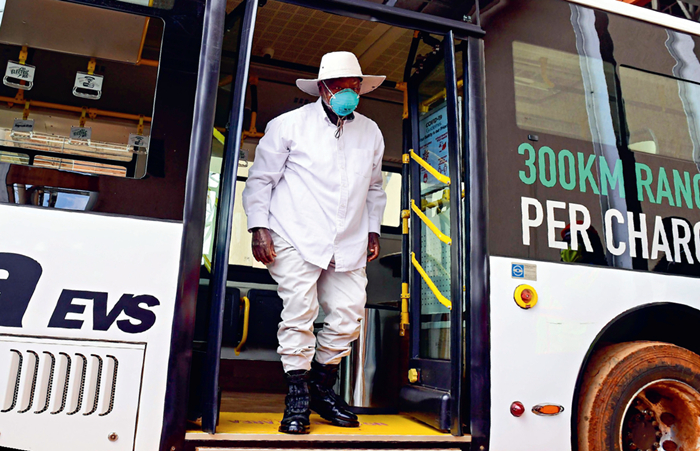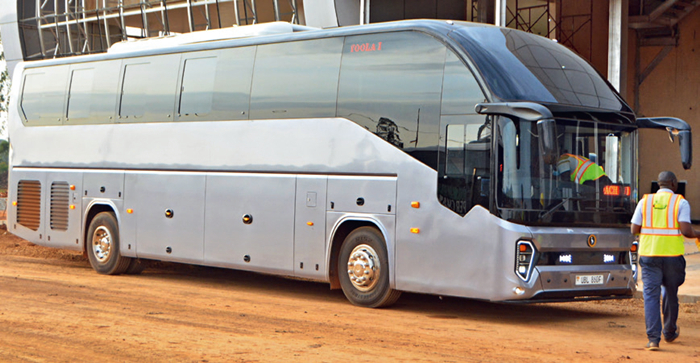|
||||||||||
| Home Nation World Business Opinion Lifestyle ChinAfrica Multimedia Columnists Documents Special Reports |
|
||||||||||
| Home Nation World Business Opinion Lifestyle ChinAfrica Multimedia Columnists Documents Special Reports |
| ChinAfrica |
| Green Bus Debut |
| Uganda is constructing the first ever electric vehicles manufacturing plant in Africa |
| Reporting from Uganda Godfrey Olukya 丨VOL. 14 MAY 2022 ·2022-05-12 |

Ugandan President Yoweri Museveni on a Kayoola electric bus on August 14, 2021 (PRESIDENT’S OFFICIAL TWITTER ACCOUNT)
Wearing yellow overalls and a yellow helmet, Jackson Mwidu shares a lunch at a local restaurant with fellow workers at the Mutai Trading Center, about 15 km from the eastern Uganda city of Jinja.
Mwidu works at the Kiira Motor Corp. (KMC) which is about 200 meters from the restaurant. “We are constructing the plant which will produce electric vehicles. I work in the electricity department which is installing a three-phase electricity line and other electrical requirements,” he said in an interview with the Anadolu News Agency.
According to Mwidu, there are more than 500 workers at the plant site doing different jobs, including constructing workshops, putting up buildings for offices and other use, building roads and doing plumbing work.
Mutai Village chief Luke Wagabaza said the community is happy because construction of the electric vehicle plant has created jobs, especially for the youths. “Before this project kicked off, many of our youth were idle without jobs. But now most of them work there [at the plant].”
He said that the standard of living in the village has also been raised in the area as a whole, because workers and managers at the plant site spend much of what they earn at local businesses. “[For example] the workers at the plant get meals from the restaurants, buy goods from local shops and rent houses in the areas,” said Wagabaza.
Second phase underway
KMC, which is a state enterprise, was established to not only make vehicles, but also create jobs for Ugandans.
KMC’s spokesperson Ruth Nasejje told ChinAfrica that the construction of the first phase of the plant began in February 2019 at the Jinja Industrial and Business Park.
“The second phase began in March 2022. The first electric bus production is expected at the end of this year. It will have the capacity to produce 22 buses every day and employ about 10,000 workers,” said Nasejje.
The construction of the plant was first established after sample electric vehicles were made in Uganda and test driven on Ugandan roads. The idea of making electric vehicles and the establishment of the plant was an initiative of Ugandan President Yoweri Museveni.
According to a statement from KMC, it developed Africa’s first hybrid vehicle, the Kiira EVS, in 2014 and Africa’s first solar electric bus, the Kayoola Solar Bus, in 2016.
“Our electric bus, which we named Kayoola (meaning carrying many people in local language), is a fully electric low floor city bus, with a range of 300 km when fully charged. We tested it for several months on the roads in the country. President Museveni travelled in one of our vehicles for a long distance during road testing,” said Thomas Kibwama, a KMC engineer.
CEO of KMC Paul Musazizi said the journey of making electric vehicles in Uganda began as far back as in 2007, when a global consortium of over 31 universities and colleges across the world took part in a Vehicle Design Summit to design and bring to market a five-seater plug-in hybrid electric vehicle.
He said that under the United States-based Massachusetts Institute of Technology design project, Uganda’s Makerere University was the only participant from Africa. The team from Makerere University Faculty of Technology later became responsible for design and integration of the low power electronics and data networking systems of the pilot vehicle. The team then designed and built the original Kayoola Solar Bus, the first solar energy bus designed and built in Africa. The Kayoola Solar Bus was launched by President Museveni back on February 16, 2016.
The new-generation bus is a fully electric, low floor city bus specifically designed for urban mass transport. At full charge, it has a range of up to 300 km with a sitting capacity of up to 90 passengers.

KMC in Uganda has manufactured the first electric buses in Africa known as Kayoola, which will go into mass production this year (GODFREY OLUKYA)
Phased plan
The successful testing of the electric bus and car led to Uganda’s cabinet deciding on April 9, 2018 to begin making electric vehicles on a commercial basis.
Then Minister of Science, Technology and Innovation Elioda Tumwesigye said, “We decided as a cabinet that making vehicles for sale was to be undertaken in a phased manner. The cabinet approved a fund of $40 million over a period of four years, beginning in the financial year 2018/19.”
It was estimated by Kenya’s cabinet that the KMC vehicle plant’s contribution to employment in Uganda was 940 jobs from the start-up investment. The full-scale plant operation is estimated to create over 2,000 direct jobs and 12,000 indirect jobs.
After the cabinet made a resolution that the country should start manufacturing electric vehicles, it was then necessary to establish a production plant.
“The government contacted the Uganda Investment Authority and asked for land. It allocated 100 acres (40.47 hectares) for the establishment of the KMC plant. The land location was in Kagogwa Village in Jinja District, near Mawoito Trading Center,” said Evelyn Anite, State Minister of Finance for Investment and Privatization.
She said that the establishment of the plant is expected to catalyze investment by small and medium enterprises in the manufacture of vehicle parts, components and autonomy systems like brake pads, seats, bolts and nuts, bumpers, vehicle electronics and navigation systems. It is also expected that it will increase demand for the utilization of Uganda’s natural resources such as steel from iron ore deposits, plastics from oil and gas, lithium batteries from graphite, vehicle upholstery and interior padding from cotton and leather and glass from silica and sand. On August 14, 2021, President Museveni laid the foundation stone for the plant at a ceremony held at the site.
“I hereby direct that when we start making the buses, there will no longer be any importation of fully built buses into Uganda. All buses must be bought from KMC,” he said.
Recognition for green initiatives
KMC was recognized for its initiatives in Green Mobility by Frost and Sullivan by being awarded the 2016 Frost and Sullivan Visionary Innovation Leadership Award in Sustainable Mobility. It has also been awarded the African Company of the Year in the 2021 African Business Leadership Awards.
Ugandan businessman Felix Babu said it is good that such a big venture is taking place in Uganda. “It will definitely improve our economy,” he said.
Yunus Lukwago, 20, was also upbeat about the initiative. “The plant will lead to some of us getting jobs. It is good for development,” he said.
But not all Ugandans support the idea of establishing a plant to make electric vehicles. One of those is a senior public figure in Uganda John Nagenda, Senior Media Advisor to President Museveni.
Writing in the New Vision newspaper, Nagenda said, “It is not necessary to spend big sums of money establishing a vehicle making plant here [in Uganda]. It is very expensive. What should be done is getting one of the companies in developed countries which make affordable vehicles and convince them to come to Uganda and start assembling their vehicles here,” he said. CA
| About Us | Contact Us | Advertise with Us | Subscribe |
| Copyright Beijing Review All rights reserved 京ICP备08005356号-5 京公网安备110102005860号 |